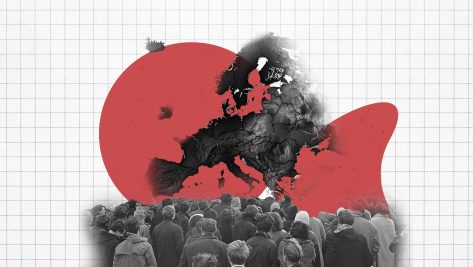Is globalization in retreat? It’s a question that has captured the attention of many an international forum and is a key issue for analysts and scholars of international relations. I have heard all types of arguments: “yes,” we are witnessing a decoupling of the world economy and a growing fragmentation into blocks that not only compete economically but also politically; “no,” interdependence is gaining traction and we have bounced back from the pandemic with levels of trade that contradict the confrontational discourse; and “maybe,” what we are witnessing is neither more nor less globalization but simply a change in focus towards resilience, open strategy autonomy, and friendshoring. There is probably some truth in all three positions, and perhaps it’s too early to definitively assess globalization’s transformation and direction.
A more pertinent question to ask at this stage, however, is why globalization has earned such a bad reputation and elicits so much rejection among vast segments of the population. This fall in status is quite striking to those of us who believe in openness and global cooperation and understand the basic principles underpinning international trade (specialization, comparative advantage, and complementarity.)
The negative attitudes are easier to understand, of course, once we acknowledge that the benefits of globalization have not been adequately shared and that there are many people in developed countries who have lost their jobs to offshoring, for example, and others in poorer regions who are exploited by foreign multinationals. There are communities that have had their traditional socioeconomic backbones broken because of openness, and their languages and culture threatened by the overwhelming presence of larger competitors.
The writer of this article is certainly a winner and embracer of globalization, as probably is the person reading these lines. You and I, my dear reader, can travel the world without much concern about being stopped at a border and deported back to our countries. We have foreign friends and experience firsthand the benefits of living in a more interconnected world. But we may not be representative of the average citizen. This is what I call “The Globalist Fracture” and it is marked by a growing divide between global elites and anti-global masses. Unless we bridge that gap and ensure that everyone can benefit from growing interdependence, we will end up destroying the process of gradual global integration that has characterized our recent history.
Anti-globalization is not new. The roots of the current movement can be traced back at least 25 years, to the wave of anti-globalization protests and demonstrations that dotted the late 1990s, for example the Battle of Seattle, the demonstration against the WTO, and the burning down of McDonald’s in France led by farmer and activist Jose Bové. Yet, even those events are heirs of a long tradition connected to critical thinking, dependence theories, and larger anti-colonialism and anti-capitalism. Taken even further back in time, the echoes of nationalism, nativism, and primitivism resonate in many of the positions that oppose globalization.
The fracture between the haves and have-nots of globalization is broadening and deepening.
In the mid-2010’s, when I worked at the OECD, the so-called “backlash against globalization” was already a concern, and an OECD Ministerial was dedicated to it. We were alarmed by how the optimism around the enhanced global cooperation – cooperation that had made major international achievements possible, such as the adoption of the 2030 Agenda and the Sustainable Development Goals, the Paris Climate Agreement, and OECD-brokered progress in combating global tax evasion – had given way to considerable setbacks like Brexit, the election of Donald Trump, and the Syrian and Crimean crises. There emerged a sense of urgency to re-engage those left behind by globalization. The agenda of multilateral institutions brought to the forefront the need to ensure that globalization was inclusive, sustainable, and fair.
Almost a decade later, however, those good intentions have not materialized – and in fact I would go so far as to say that what we are witnessing now is a renewed backlash, albeit of a different nature. The fracture between the haves and have-nots of globalization is broadening and deepening, and it’s showing some worryingly new characteristics. In my view, this is the result of the continued stress tests over the past few years: the pandemic, which brought the world economy to a standstill; Ukraine with its awakening of inter-state conflict, border revisionism, and even threat of nuclear war; the tragedy unfolding in Gaza and the risk of regional escalation; the acceleration of US-China rivalry; and the rapid erosion of democracy and growing questioning of elections…to name a few examples. These shocks are coupled with the evident inability of our multilateral institutions to adequately meet global challenges like climate change or the governance of new technologies like artificial intelligence and biogenetics.
The accumulation of all these elements creates a sense of fear and fragility. This, in turn, reinforces the divide between globalist elites and wider populations – the former embrace change, and see potential solutions to any of those threats by doubling down on the promise of globalization, while the latter tend to blame interdependence for many of these malaises and long for the security and certainty of nation-states.
In addition, accusations of hypocrisy and double standards are commonly thrown at the global elite and richer countries. While the world seems on the verge of collapse, companies keep making record profits, billionaires get richer, and the privileged exist in a protected bubble. Populations are asked to make sacrifices that they do not see their leaders making. Many of the countries that until recently advocated open markets now protect their industries, arguing for strategic autonomy and resilience. They find it acceptable to dig out coal when their energy supplies are threatened by geopolitics, foregoing their green promises. They voice anxiety about overpopulation and the sustainability of their welfare states, while erecting barriers to migration and promoting birthrates among their nationals.
The globalist fracture grows both domestically and internationally, fed by the dichotomy between those who win and those who lose: cities vs. countryside; white-collar workers vs. blue-collar; cosmopolitans vs. nationalists. Our world is increasingly fragmented, and such a divide is more and more visible, being magnified through enhanced access to information – as well as to disinformation.
What can we do to mend this situation and heal the fracture? Allow me to suggest three key values that globalists should fight to uphold.
The main problem of globalism is that it is perceived by most of the population as detached and alien.
The first appeals to fairness and solidarity. It is time to turn our much-proclaimed concerns about inclusion into reality. For as long as globalization leaves some people behind, it will have detractors – more so if the ranks of losers encompass vast portions of humankind. It is now time to put the same attention to the distribution of benefits as we once did to growing the pie. One inconvenient truth needs to be told: the elites must give up some of the living standards that they currently enjoy and focus less on wealth and more on happiness and satisfaction. Otherwise, the system will collapse, and everyone will end up losing.
Second, we need consistency and moral standing in order to maintain globalist credibility. There cannot be exceptions made to climate commitments or new barriers to international trade – this is akin to changing the rules halfway through the game just to keep your standing. The same applies to double standards on geopolitical conflicts when working with allies versus competitors, or using a different bar to measure human rights or the violation of freedoms and liberties.
Finally, we need ownership and accountability. The main problem of globalism is that it is perceived by most of the population as detached and alien. Most people see multilateralism as a bureaucratic construct, catering to the interests of the powerful. Think about it: a great deal of our identitarian adscription to our countries relies on the fact that, one way or another, our leaders and institutions are accountable to us. This is obvious in democracies when we can elect our representatives. But even in autocracies, there is a proximity between power and citizens that is not found in international organizations or the intergovernmental space. A minimum degree of familiarity is absent because they lack the mechanisms of direct representation and scrutiny, even of basic awareness.
At the end of the day, it comes down to empathy and long-termism. Globalism should encapsulate the promise of a better world and a better life for everyone, not just a few. It should embody the belief that humankind is one and the realization that our success as a species relies on our unique and innate ability to cooperate. In the long-term, we can only win if everyone wins, even if it is at the cost of giving up privileges in the short-term and this may very well entail sacrifice, especially for the elites. Yet, our survival depends not only on believing in globalism but delivering it.
© IE Insights.











